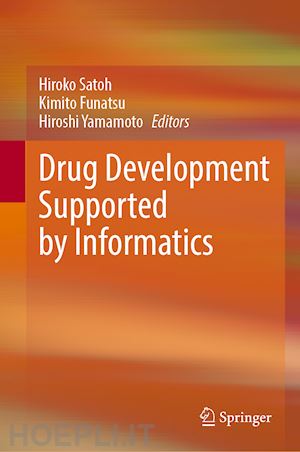

Questo prodotto usufruisce delle SPEDIZIONI GRATIS
selezionando l'opzione Corriere Veloce in fase di ordine.
Pagabile anche con Carta della cultura giovani e del merito, 18App Bonus Cultura e Carta del Docente
This book describes the state-of-the-art of chemoinformatics, bioinformatics, materials informatics and measurement/metrology informatics to develop drugs with desired activity or physicochemical properties and to optimize the functionality, efficacy, safety and quality of the compounds for drugs. Recently, "AI drug discovery", drug discovery research utilizing artificial intelligence technology such as machine learning, has attracted much attention. This book provides an overview of the four applied informatics fields and their applications in drug development for a wide spectrum of readers from learners to professional scientists in academia and industry. It focuses on the basic research stage of drug development with contributions from experts at the forefront of these fields. The authors hope that this book will be of assistance to explore new opportunities for collaboration between pharmaceutical science and informatics.
The AI Trends in Chemical Space for Drug Discovery.- Screening Methods for Drugs Using Chemoinformatics Methods for Beginners.- Data-driven Molecular Structure Generation for Inverse QSPR/QSAR Problem.- Materials Informatics with Limited Data.- Primer on Graph Machine Learning.- Subgraph-based Molecular Graph Generation.- Language Models in Molecular Discovery.- Transformers and Large Language Models for Chemistry and Drug Discovery.- Drug Discovery and Drug Repositioning Using Computational Methods.- Two and Three-dimensional Molecular Representations in Ligand-based Approaches.- Electronic-Structure Informatics for Drug Development.- Data-Driven Chemistry for Developing Organic Synthesis Routes for Functional Chemicals.- “Quantum-Chemoinformatics” for Design and Discovery of New Molecules and Reactions.- Toxicity Prediction System for Chemical Substances Based on Toxicity Expression Mechanisms - AI-SHIPS.- Data Assimilation to Integrate High-speed Atomic Force Microscopy with Biomolecular Simulations: Characterization of Drug Target Functions.- Potential of High-Spatiotemporal Resolution Live Cell Imaging for Drug Discovery and Development.- Design of Biomaterials Using Informatics.- Monitoring and Controlling in Continuous Manufacturing Process.- Formulation using Hansen Solubility Parameters.
Dr. Hiroko Satoh, Associate Professor at Research Organization of Information and Systems (ROIS) and Research Scientist at Department of Chemistry, University of Zurich, is a chemist specializing in the fields of chemoinformatics and computational chemistry. In the early stage of her carreer, she developed SOPHIA, which is one of the first data-driven systems for chemical reaction prediction. She received many awards such as the Young Scientists’ Prize from the MEXT (Ministry of Education, Culture, Sports, Science and Technology, Japan) and the Science and Technology Information Award from Japan Science and Technology Agency (JST).
Dr. Kimito Funatsu, Professor Emeritus, The University of Tokyo, is an applied chemist specializing in chemoinformatics and data-driven chemistry. Currently he is the director of Data Science Center in Nara Institute of Science and Technology. He has received many awards such as the Herman Skolnik Award from the American Chemical Society in 2019 and Academic Award from the Chemical Society of Japan. He is Japan's leading chemoinformatics and data-driven chemistry researcher.
Dr. Hiroshi Yamamoto was a company researcher in AGC Inc., and after retirement from it in 2020, is the CEO of pirika.comLLC as well as a part-time lecturer in Yokohama National University. He is specialized in polymer synthesis, computer science, information science, chemical engineering and computer programing. In the company, he promoted research projects on development and application of physical property estimation methods for CFC substitute compounds using chemoinformatics. Also he is a senior developer of a computer software, Hansen Solubility Parameters in Practice (HSPiP), and is Japan's leading expert on Hansen solubility parameters used in drug discovery and other applications.











Il sito utilizza cookie ed altri strumenti di tracciamento che raccolgono informazioni dal dispositivo dell’utente. Oltre ai cookie tecnici ed analitici aggregati, strettamente necessari per il funzionamento di questo sito web, previo consenso dell’utente possono essere installati cookie di profilazione e marketing e cookie dei social media. Cliccando su “Accetto tutti i cookie” saranno attivate tutte le categorie di cookie. Per accettare solo deterninate categorie di cookie, cliccare invece su “Impostazioni cookie”. Chiudendo il banner o continuando a navigare saranno installati solo cookie tecnici. Per maggiori dettagli, consultare la Cookie Policy.